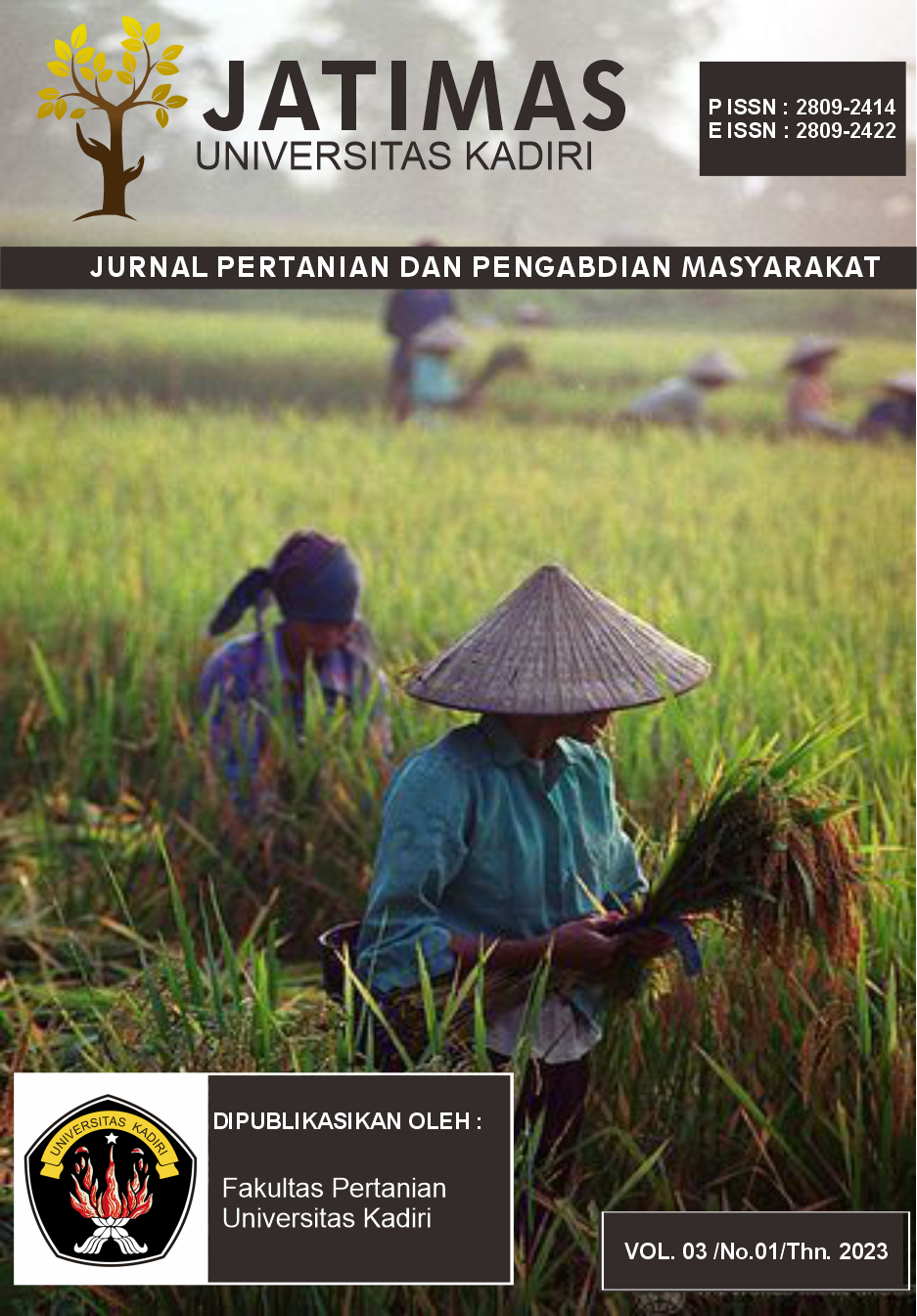Sosialisasi Pemanfaatan Pekarangan Sebagai Sumber Pangan Dan Desa Ramah Lingkungan di Kabupaten Kediri
DOI:
https://doi.org/10.30737/jatimas.v3i1.4557Keywords:
Horticultural, Socialization, YardAbstract
Horticultural is one of the cultivation of plants utilizing yards. Horticultural commodities that can be planted in the yard include vegetables, fruits, biopharmaceuticals and ornamental plants. The use of yard land as a place for the cultivation of horticultural commodities has good benefits for meeting the food and nutritional needs of families. This is in line with the government program, Sustainable Food Courts (P2L). Activities that must be carried out by the government, both at the central and regional levels to fulfill family nutrition are to support activities that have the potential to improve healthy lifestyles with a variety of local foods so that people are healthier and more productive. The Sustainable Pangan Pekarangan Program is one of the activities to support stunting prevention to improve the quality of life. The socialization activity was carried out in Banjarejo Village, Ngadiluwih District, Kediri Regency. The aim of socializing the use of yards as a source of food and an environmentally friendly village is to empower residents in Banjarejo village to fulfil nutritious food by planting horticultural crops in their yards so that they can help prevent stunting and increase household income. From the results of the socialization, residents in Banjarejo Village were able to understand the process of planting lemon seeds and cultivating horticultural crops in their yards.
Tanaman hortikultura merupakan salah satu budidaya tanaman dengan memanfaatkan lahan pekarangan. Komoditas hortikultura yang dapat ditanam di lahan pekarangan antara lain tanaman sayuran, buah-buahan, biofarmaka dan tanaman hias. Pemanfaatan lahan pekarangan sebagai tempat untuk budidaya komoditas hortikultura memiliki manfaat yang baik bagi pemenuhan kebutuhan pangan dan gizi keluarga. Hal ini selaras dengan program pemerintah, yaitu Pekarangan Pangan Lestari (P2L). Kegiatan yang wajib dilakukan oleh pemerintah, baik di tingkat pusat ataupun daerah untuk pemenuhan gizi keluarga adalah mendukung adanya kegiatan yang berpotensi meningkatkan pola hidup sehat dengan aneka ragam pangan local supaya masyarakat lebih sehat dan produktif. Program Pekarangan Pangan Lestari merupakan salah satu kegiatan dalam mendukung pencegahan stunting untuk meningkatkan kualiatas hidup. Kegiatan sosialisasi dilaksanakan di Desa Banjarejo, Kecamatan Ngadiluwih, Kabupaten Kediri. Tujuan sosialiasi pemanfaatan lahan pekarangan sebagai sumber pangan dan desa ramah lingkungan adalah memberdayakan warga di desa Banjarejo dalam pemenuhan pangan yang bergizi dengan menanam tanaman hortikultura dilahan pekarangan, sehingga dapat membantu dalam pencegahan stunting serta dapat meningkatkan pendapatan rumah tangga. Dari hasil sosialisasi, warga di Desa Banjarejo mampu memahami proses penanaman bibit lemon dan budidaya tanaman hortikulutura dilahan pekarangan.
References
Badan Ketahanan Pangan. (2020). Badan ketahanan pangan kementerian pertanian. In Petunjuk Teknis Bantuan Pemerintah Kegiatan Pekarangan Pangan Lestari (P2L) (p. 92).
Kementerian Desa Pembangunan Daerah Tertinggal dan Transmigrasi. (2017). Buku saku desa dalam penanganan stunting. Buku Saku Desa Dalam Penanganan Stunting, 42.
Luthfiya, R. G. (2022). Perbedaan Rerata Asupan Gizi Dari Pemanfaatan Pekarangan Rumah Pada Balita Stunting Dan Tidak Stunting Di Wilayah Kerja Puskesmas Banjar Agung.
Muamar, M. R. (2014). JESBIO Vol . III No . 5 , November 2014 Pengaruh Penggunaan Sungkup Plastik Berwarna Terhadap Pertumbuhan Tanaman Sawi ( Brassica rapa ) Program Studi Pendidikan Biologi Universitas Almuslim , Bireuen Email: muamar.mrezeki@gmail.com Diterima 25 April 201. III(5), 14–21.
Muyassir, Sufardi, & Saputra, I. (2012). Jenis dan Dosis Pupuk Organik. 1–8. Rosmalina, Y., Luciasari, E., Aditianti, & Ernawati, F. (2018). Upaya Pencegahan Dan Penanggulangan Batita Stunting Systematic Review. 41(1), 1–14.
Santosa, S., Rohmanugraha, D., Antoro, Y. T., Nurjanah, T. R., Wardani, E., HR, N. J., M., I. L., Hidayah, N., Ermawati, E., Rahman, M. D., & Yusron, M. (2018). Optimalisasi Pemanfaatan Pekarangan Rumah dengan Sistem Vertikultur dari Limbah Plastik Sebagai Upaya Mendukung Indonesia Bebas Sampah dan Mewujudkan Ketahanan Pangan Keluarga di Dukuh Baturan Kec. Gantiwarno Kab. Klaten. Aplikasia: Jurnal Aplikasi Ilmu-Ilmu Agama, 18(2), 127. https://doi.org/10.14421/aplikasia.v18i2.1845
Solihin, E., Sandrawati, A., & Kurniawan, W. (2018). Pemanfaatan pekarangan rumah untuk budidaya sayuran sebagai penyedia gizi sehat keluarga. Jurnal Pengabdian Kepada Masyarakat, 2(8), 590–593.
Susanti, M., Pasaribu, N. P., & Purwakusuma, W. (2020). Sosialisasi Penggunaan Lahan Sempit Melalui Pemanfaatan Pekarangan Rumah Di Desa Sirnagalih. Jurnal Pusat Inovasi Masyarakat (PIM), Vol. 5 No.(June 2019), 637–641. https://jurnal.ipb.ac.id/index.php/pim/article/view/31397/20035%0Ahttps://scholar.google.com/scholar?qrelated:hxUtpZ KxlAJ: scholar.google.com/ -scioqsource:%22jurnal+pusat+inovasi+masyarakat%22+source:pim -hlen -as_sdt2007 -as_ylo2016 -as_yhi2020
Widodo, K. H., & Kusuma, Z. (2018). Pertumbuhan Tanaman Jagung di Inceptisol Effects of Compost on Soul Physical Properties and Growth of Maize on an Inceptisol. 5(2), 959–967
Downloads
Published
Versions
- 26-07-2023 (2)
- 29-05-2023 (1)
Issue
Section
License
Copyright (c) 2023 Irene Ratri Andia Sasmita, Devina Cinantya Anindita, Zupri Nur Cahyono

This work is licensed under a Creative Commons Attribution-NonCommercial-NoDerivatives 4.0 International License.
Authors who publish in this journal agree to the following terms:
- Authors retain copyright with the work simultaneously licensed under a Creative Commons Attribution License (https://creativecommons.org/licenses/by-nc-nd/4.0/) that allows others to share the work with an acknowledgement of the work's authorship. Permitted third-party reuse is defined by the Creative Commons Attribution-NonCommercial-NoDerivs (CC BY-NC-ND). This permission allows users to copy and distribute the Article, provided this is not done for commercial purposes and further does not permit distribution of the Article if it is changed or edited in any way, and provided the user gives appropriate credit (with a link to the formal publication through the relevant DOI), provides a link to the license, and that the licensor is not represented as endorsing the use made of the work.
- Authors are able to enter into separate, additional contractual arrangements for the non-exclusive distribution of the journal's published version of the work (e.g., post it to an institutional repository or publish it in a book).
- Authors are permitted and encouraged to post their work online (e.g., in institutional repositories or on their website) prior to and during the submission process, as it can lead to productive exchanges, as well as earlier and greater citation of published work.
Deprecated: json_decode(): Passing null to parameter #1 ($json) of type string is deprecated in /home/ojs.unik-kediri.ac.id/public_html/plugins/generic/citations/CitationsPlugin.php on line 68



